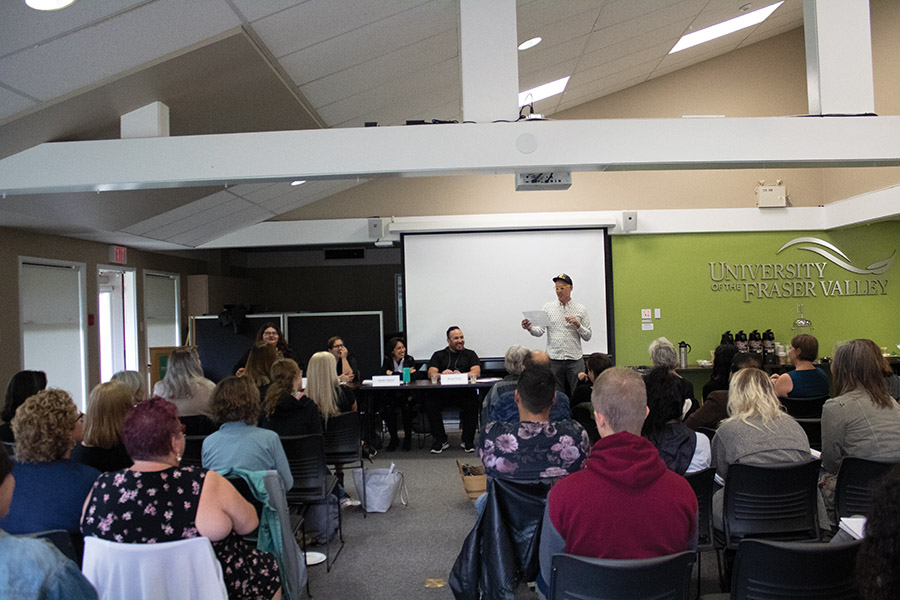UFV hosted its second literary festival, a celebration of local talent, on Sept. 13 and 14. The Fraser Valley Literary Festival opened on Friday evening with a wine and cheese event and reopened on Saturday afternoon, presenting two writing panels that featured the works and conversations of various local authors.
“The goal with [the] Fraser Valley Literary Festival is to introduce students and the Fraser Valley community to a wide variety of writers contributing to the current literary community. B.C. has a lot of very talented writers, so we were really blessed with a plethora of options,” said Andrea MacPherson, artistic director of the Fraser Valley Literary Festival and UFV associate professor. “We chose these writers for a number of reasons: variety in genre, new publications, diverse backgrounds, gender [inclusivity]. It’s really important for us to curate a festival that is representative of the vibrant writing community in B.C.”
The keynote speakers for Friday’s event included lectures from Shazia Hafiz Ramji, a poet and author of Port of Being, and Michael V. Smith, author of Cumberland and Progress. Both teach creative writing. Ramji reflected on her journey as a writer, her language both enchanting and relatable. Smith shared the concept of “Writing from Silence”: a concept to recognize who is erased, excluded, or reduced to shallow representation within our stories. These themes would resurface the following day.
On Saturday, Ramji returned to moderate the first panel of the afternoon. “The Terrible and the Sublime: From Monsters to Saints” generated discussions from transformation, to romanticizing trauma (and writing through it), to the role of community that exists within these stories. The panel consisted of authors Marita Dachsel, Danny Ramadan, Doretta Lau, and Jonina Kirton.
“Transformation is at the heart of what we do everyday,” Ramji remarked on writing.
“The only legacy we have is our stories,” said Dachsel.
The topics expanded into cultural appropriation and the domineering presence of white-centric stories during the Q&A portion. The authors distinguished the borders of which stories are our own to tell and which are stolen by privileged writers outside of marginalized cultures. Ramadan left us with these thoughts:
“You can do your research, interview, even pay [sensitivity readers] money if you can or baked goods if you can’t, but at the end of the day, [writing appropriative stories] is a challenge. Because there are things that you will miss and not understand [about that culture]. Ask [yourself] if you are taking away a space from someone else.”
After a short intermission, the second panel moved to the themes of “Myth, Secrets, and Ghosts,” offering readings from Hasan Namir, Minelle Mahtani, jaye simpson, and Alex Leslie. Namir awed the audience with personal anecdotes to expand on his readings, and Mahtani’s belting voice filled the room with applause as she recounted the burden of loss and comfort from ghosts. Simpson bewitched the audience with poetry that punctured the room and drew visible reactions during their delivery, and Leslie’s essay broadened the scope of myth and secret: who decides what truths become myth and the dangers of those who wield that decision. These talented wordsmiths spared no minute as they bounced from discussions of ghosts of the land, the colonial violence against Indigenous peoples, and the delicate permissions of writing for the deceased.
As the event came to a close, the final keynote speaker, UBCO’s Laisha Rosnau, shared a circular piece that explicably, though unintentionally, tied back to the conversation of community in stories and the connections that resonate through sharing what we know and stepping back from narratives that don’t belong to us. In a private interview, she surmised:
“There are still imbalances and abuses of power and privilege in [schools], colleges and universities, funding bodies, the publishing world, and in any institution in which maintaining a status quo is advantageous to those who benefit from, and have gotten used to, holding the power — unconsciously or not.”
“Books, articles, op-ed pieces, tweets, and Instagram stories can never substitute what happens in a room with people talking and listening,” Rosnau wrote, reflecting on the impact of the literary festival, “and listening to that which we’ve not heard or considered in quite those ways before — and this is the most important and valuable thing of all.”
For students who wish to participate in the Fraser Valley’s literary scene as we wait for next year’s festival, MacPherson suggests “the Vancouver Writers Festival, the FINE reading series, the Real Vancouver Writers Series, and other UFV literary initiatives, [such as] the Writer in Residence. My general advice for anyone who is passionate about writing: read! Attend events! Read some more!”
Image: David Myles/The Cascade


